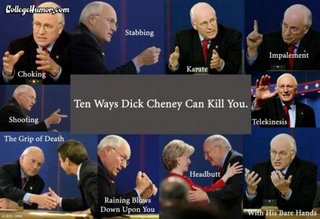I understand that a retired major general can't really say that the President is the real problem, but I still think all this Rumsfeld bashing on the part of the pro-war crowd is kind of silly. Sure, he should have been fired a long time ago, along with everyone else in the administration, but we've reached the point where continued calls for them to straighten up and fly right just seem like a waste of time and column inches. Beyond that, the military top brass should have realized by now that they are the last people Bush, et al., listen to when it comes to military matters.
Still, I'm 100% behind the suggestion that Lieberman replace Rumsfeld as SecDef, as that seems like the best chance we have of getting him out of the Senate.
A Top-Down Review for the PentagonNYT, March 19, 2006
DURING World War II, American soldiers en route to Britain before D-Day were given a pamphlet on how to behave while awaiting the invasion. The most important quote in it was this: "It is impolite to criticize your host; it is militarily stupid to criticize your allies."
By that rule, Defense Secretary Donald Rumsfeld is not competent to lead our armed forces. First, his failure to build coalitions with our allies from what he dismissively called "old Europe" has imposed far greater demands and risks on our soldiers in Iraq than necessary. Second, he alienated his allies in our own military, ignoring the advice of seasoned officers and denying subordinates any chance for input.
In sum, he has shown himself incompetent strategically, operationally and tactically, and is far more than anyone else responsible for what has happened to our important mission in Iraq. Mr. Rumsfeld must step down.
In the five years Mr. Rumsfeld has presided over the Pentagon, I have seen a climate of groupthink become dominant and a growing reluctance by experienced military men and civilians to challenge the notions of the senior leadership.
I thought we had a glimmer of hope last November when Gen. Peter Pace, the chairman of the Joint Chiefs of Staff, faced off with Mr. Rumsfeld on the question of how our soldiers should react if they witnessed illegal treatment of prisoners by Iraqi authorities. (General Pace's view was that our soldiers should intervene, while Mr. Rumsfeld's position was that they should simply report the incident to superiors.)
Unfortunately, the general subsequently backed down and supported the secretary's call to have the rules clarified, giving the impression that our senior man in uniform is just as intimidated by Secretary Rumsfeld as was his predecessor, Gen. Richard Myers.
Mr. Rumsfeld has put the Pentagon at the mercy of his ego, his cold warrior's view of the world and his unrealistic confidence in technology to replace manpower. As a result, the Army finds itself severely undermanned — cut to 10 active divisions but asked by the administration to support a foreign policy that requires at least 12 or 14.
Only Gen. Eric Shinseki, the Army chief of staff when President Bush was elected, had the courage to challenge the downsizing plans. So Mr. Rumsfeld retaliated by naming General Shinseki's successor more than a year before his scheduled retirement, effectively undercutting his authority. The rest of the senior brass got the message, and nobody has complained since.
Now the Pentagon's new Quadrennial Defense Review shows that Mr. Rumsfeld also fails to understand the nature of protracted counterinsurgency warfare in Iraq and the demands it places on ground forces. The document, amazingly, does not call for enlarging the Army; rather, it increases only our Special Operations forces, by a token 15 percent, maybe 1,500 troops.
Mr. Rumsfeld has also failed in terms of operations in Iraq. He rejected the so-called Powell Doctrine of overwhelming force and sent just enough tech-enhanced troops to complete what we called Phase III of the war — ground combat against the uniformed Iraqis. He ignored competent advisers like Gen. Anthony Zinni and others who predicted that the Iraqi Army and security forces might melt away after the state apparatus self-destructed, leading to chaos.
It is all too clear that General Shinseki was right: several hundred thousand men would have made a big difference then, as we began Phase IV, or country reconstruction. There was never a question that we would make quick work of the Iraqi Army.
The true professional always looks to the "What's next?" phase. Unfortunately, the supreme commander, Gen. Tommy Franks, either didn't heed that rule or succumbed to Secretary Rumsfeld's bullying. We won't know which until some bright historian writes the true story of Mr. Rumsfeld and the generals he took to war, an Iraq version of the Vietnam War classic "Dereliction of Duty" by H. R. McMaster.
Last, you don't expect a secretary of defense to be criticized for tactical ineptness. Normally, tactics are the domain of the soldier on the ground. But in this case we all felt what L. Paul Bremer, the former viceroy in Iraq, has called the "8,000-mile screwdriver" reaching from the Pentagon. Commanders in the field had their discretionary financing for things like rebuilding hospitals and providing police uniforms randomly cut; money to pay Iraqi construction firms to build barracks was withheld; contracts we made for purchasing military equipment for the new Iraqi Army were rewritten back in Washington.
Donald Rumsfeld demands more than loyalty. He wants fealty. And he has hired men who give it. Consider the new secretary of the Army, Francis Harvey, who when faced with the compelling need to increase the service's size has refused to do so. He is instead relying on the shell game of hiring civilians to do jobs that had previously been done by soldiers, and thus keeping the force strength static on paper. This tactic may help for a bit, but it will likely fall apart in the next budget cycle, with those positions swiftly eliminated.
So, what to do?
First, President Bush should accept the offer to resign that Mr. Rumsfeld says he has tendered more than once, and hire a man who will listen to and support the magnificent soldiers on the ground. Perhaps a proven Democrat like Senator Joseph Lieberman could repair fissures that have arisen both between parties and between uniformed men and the Pentagon big shots.
More vital in the longer term, Congress must assert itself. Too much power has shifted to the executive branch, not just in terms of waging war but also in planning the military of the future. Congress should remember it still has the power of the purse; it should call our generals, colonels, captains and sergeants to testify frequently, so that their opinions and needs are known to the men they lead. Then when they are asked if they have enough troops — and no soldier has ever had enough of anything, more is always better — the reply is public.
Our most important, and sometimes most severe, judges are our subordinates. That is a fact I discovered early in my military career. It is, unfortunately, a lesson Donald Rumsfeld seems incapable of learning.
Paul D. Eaton, a retired Army major general, was in charge of training the Iraqi military from 2003 to 2004.















